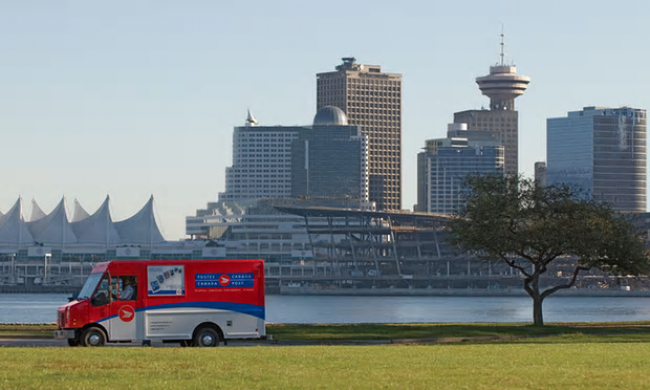Articles Menu

The story has an air of inevitability. A rise in online communication has led to a inexorable decline of mail. Our local post offices, squeezed by the digital era, will soon be quaint outposts of a bygone era. What’s left to do but end door-to-door mail delivery, lay off postal workers, and hand over what remains to private companies?
This tale may be repeated endlessly by the media, but little of it holds true. The drop-off in mail, while accurate, has been offset by a pick-up in e-parcel delivery. Canada Post remains profitable – bringing 1.5 billion in profits to the government in the last decade alone.
And its profits cannot capture another striking value: there are almost twice as many post offices as Canada’s ubiquitous coffee chain Tim Hortons. In its bricks-and-mortar scale, in the millions of its daily human interactions, the postal service knits together thousands of communities — a retail network unlike any other in the country.
Forget the notion that the post office has exhausted its purpose. We have scarcely begun to realize its potential.
The postal service may be roiled by a digital crisis, but it could be retooled to simultaneously address far more severe crises: rising inequality that has left millions overworked and indebted; climate-change delivering increasingly extreme weather; continuing injustices faced by Indigenous peoples; and an aging and increasingly isolated population.
A bold proposal launched last week by the Canadian Union of Postal Workers lays out how this reimagining would look. Their vision begins by transforming the post office itself: putting solar panels on its roofs and made-in-Canada electric vehicles on the roads, and installing charging stations outside. (Full disclosure: I was part of a team that worked with the postal workers on this plan.)
They wouldn’t rest at being a model of sustainability. They would offer the public the possibility of far more: the delivery of farm food to your home, checking in on elders, and promoting climate-friendly businesses. Most dramatically, they would also offer postal banking: affordable basic services as well as loans and support to start a renewable energy project at your home or in the community.
In many places, especially rurally, the post office already serves as a community hub; but now it could also help power a new economy. This is exactly the kind of transformative public services we need in an age of overlapping crises – fostering more caring communities and sustainable economic development, while helping bring down carbon emissions.
Yet elements over each one of the policies the postal workers propose have been successfully implemented in other countries: food delivery to communities in France; electrification of postal vehicles in Norway; assistance to elders in Japan; and postal banking in Germany, New Zealand, Brazil and Italy.
Postal banking, however unexpected, is in fact straightforward: by offering simple deposits and withdrawals, loans and cheque-cashing through its 6300 postal outlets, the postal service would instantly become Canada’s most accessible bank. This would be a boon to lower-income, unbanked or Indigenous people who are currently forced to rely on money marts and payday outlets. Infuriated by ATM withdrawal fees or cut-throat loan rates? So are millions of other Canadians.
Canada Post’s management, appointed by ex Prime Minister Stephen Harper, insists the obstacles to postal banking are “insurmountable”. Yet when reporters got their hands on a unpublicized internal study on the matter, it showed Canada Post had in fact reached the opposite conclusion: postal banking would be a “win-win” strategy. Imagine what might be possible: raising millions to subsidize mail delivery, unleashing community-owned wind and solar projects across the country, and providing stiff competition to the corporate banks, making banking much more affordable.
That hints at the real obstacle to this proposal: private profits. Canada previously had postal banking, but lobbying by the banks killed it in 1968. There’s a very good reason why the big banks would fight a plan to bring back postal banking: they made $35 billion in profits last year alone.
While climate change and soaring inequality make these sorts of policies necessary, the current political climate in Canada make them perfectly practical as well. The new Liberal government has promised a review of Canada Post, has a new climate change plan in the works, and is preparing massive stimulus funding in the next budget.
We must demand the Liberals don’t simply throw money at projects that are shovel-ready – they need to be shovel-worthy. That means no expanded highways or pipelines that lock in a fossil fuel economy for several more decades – and it means saying no when Premiers like Christy Clark pitch ten-lane bridges as “green infrastructure”. It also means getting behind projects – like the postal worker’s ambitious plan – that accomplish everything the Liberals claim they’re for: respecting the rights of Indigenous peoples, bringing emissions radically down, and making the economy more equal and humane.
The prophecies about the postal service’s demise are premature. Forget what you think you know about Canada’s post office: it’s time for a revolutionary green make-over.

Our postal service can deliver the sustainable infrastructure of the next economy: postal banking that finances green energy, services for seniors, farm-to-table food delivery, coast-to-coast charging stations for electric cars, and much more...
An equitable, climate-friendly economy is in sight. Our post office can deliver it.
Naomi Klein
Clayton Thomas-Muller
Campaigner, 350.org; Mathias Colomb Cree Nation
Mike Palecek
President, Canadian Union of Postal Workers
David Suzuki
Donald Lafleur
Vice President, Canadian Labour Congress




















... and keep in touch: